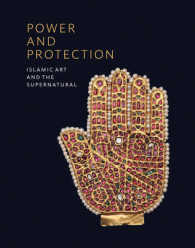- ホーム
- > 洋書
- > ドイツ書
- > Humanities, Arts & Music
- > Philosophy
- > middle ages
Full Description
"More than any other living scholar of medieval philosophy, Gyula Klima has influenced the way we read and understand philosophical texts by showing how the questions they ask can be placed in a modern context without loss or distortion. The key to his approach is a respect for medieval authors coupled with a commitment to regarding their texts as a genuine source of insight on questions in metaphysics, theology, psychology, logic, and the philosophy of language—as opposed to assimilating what they say to modern doctrines, or using medieval discussions as a foil for 'new and improved' conceptual schemes." Jack Zupko, University of Alberta
"Gyula Klima is widely recognized as one of the world's leading experts on thirteenth and fourteenth-century Latin philosophy, with his own, distinctive analytic approach, which brings out both the similarities and differences between medieval and contemporary logic and semantics." John Marenbon, Trinity College, University of Cambridge
"Gyula Klima has been a towering figure in the field of medieval philosophy for decades. His influence comprises not only the scholarly results of his work, but also intense and generous mentorship of students and junior colleagues. This volume is a perfect reflection of the esteem that he enjoys around the world, collecting excellent pieces by established as well as up-and-coming scholars of medieval philosophy." Catarina Dutilh Novaes, Vrije Universiteit Amsterdam
"For four decades now, Gyula Klima has been setting the standard among medievalists for philosophical sophistication and historical rigor. This collection of wide-ranging studies from leading scholars in the field offers a worthy tribute to that legacy." Robert Pasnau, University of Colorado Boulder
Gyula Klima is Professor of Philosophy at Fordham University, and Senior Research Fellow, Consultant, and the Director of Institute for the History of Ideas of the Hungarian Research Institute in Budapest. In 2022, the President of Hungary awarded him the Knight's Cross of the Hungarian Order of Merit, "in recognition of his outstanding academic career, significant research work and exemplary leadership." In this volume, colleagues, collaborators, and students celebrate Klima's project with new essays on Plotinus, Anselm, Aquinas, Buridan, Ockham and others, exploring specific questions in philosophy of mind, philosophy of language, metaphysics, and logic.
No contemporary surpasses Kripke and Klima in semantics and metaphysics, but only Gyula Klima's thought ranges flawlessly over classical philosophy as well. The volume is a fitting tribute to the master. David Twetten, Marquette University
Contents
Introduction: In Appreciation of Gyula Klima (Joshua P. Hochschild).- Part I. Before Aquinas.- Chapter 1. Pythagoras, the Philosopher and Grammar Teacher (Br. Lib. Add. MS 37516 recto) (István Bodnár).- Chapter 2. Abelard on Existential Inference (Peter King).- Chapter 3. Rereading "Saint Anselm's Proof" (Daniel Patrick Moloney).- Chapter 4. Albert the Great Among the Pygmies: Explaining Animal Intelligence in the Thirteenth Century (Peter G. Sobol).- Part II. Aquinas.- Chapter 5. "The Essential Differentiae of Things are Unknown to Us":Thomas Aquinas on the Limits of the Knowability of Natural Substances (Fabrizio Amerini).- Chapter 6. Aquinas, perversor philosophiae suae (Gábor Borbély).- Chapter 7. Knowing Non-existent Natures: A Problem for Aquinas's Semantics of Essence (Turner C. Nevitt).- Chapter 8. Metaphors, Dead and Alive (Martin Klein).- Chapter 9. Truth and Person in Aquinas's De veritate (Robert J. Dobie).- Chapter 10. Transcendentals Explained Through Syncategoremata: Is Being as Truth a Transcendental According to Thomas Aquinas? (Giovanni Ventimiglia).- Chapter 11. Truth as a Transcendental (Edward Feser).- Part III. Ockham and Buridan.- Chapter 12. Four Notes on the Grammar of Ockham's Mental Language (Claude Panaccio).- Chapter 13. Thoughts About Things: Aquinas, Buridan and Late Medieval Nominalism (Calvin G. Normore).- Chapter 14. Buridan's Reinterpretation of Natural Possibility and Necessity (Guido Alt).- Chapter 15. The Semantic Account of Formal Consequence, from Alfred Tarski Back to John Buridan (Jacob Archambault).- Chapter 16. Skeptical Motivators in Buridan's Philosophy of Science (Ariane Economos).- Part IV. Other Scholastics.- Chapter 17. Parody or Touch-Up? Duns Scotus's Engagement with Anselm's Proslogion Argument (Giorgio Pini).- Chapter 18. De se vs. de facto Ontology in Late-Medieval Realism (Laurent Cesalli).- Chapter 19. Connotation vs. Extrinsic Denomination: Peter Auriol on Intentions and Intellectual Cognition (Giacomo Fornasieri).- Chapter 20. Temporal Origins Essentialism and Gappy Existence in Marsilius of Inghen's Quaestiones super libros De generatione et corruptione (Adam Wood)).- Chapter 21. John of Ripa and the Metaphysics of Christology (Richard Cross).- Afterword.- Gyula Klima as Medievalist: A Select Bibliographical Essay (Jacob Archambault).








